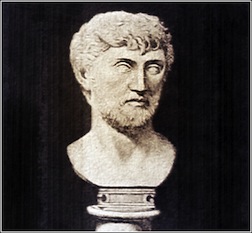What Wine Is For: An Epicurean Response
As I continue to grow older, I find that the questions that occupy my intellect tend to grow more basic. The questions that occur to me and capture my interest tend to be substantially broader than the kind of trivialities that were stationed in my more youthful mind.
I only broach the question above here because lately I've been questioning (or at least trying to understand) how I could have possibly produced more than 2,450 posts here at Fermentation and how, after 20 years concentrated on the marketing of wine, I remain concentrated intellectually and functionally on the marketing of wine.
Very simply, wine is for pleasure.
True it is for drinking. True it is for commerce. But so is water and so are widgets, and neither of these can also claim that they are also for pleasure.
That wine is decidedly and fundamentally for the pursuit of pleasure makes it a servant of the intellectual and philosophical commands of the wise Epicurus and sublime Lucretius, the great and ancient proponents of the notion that, given we all are but combinations of atoms just as the plant and animals are such combinations, and given that we all will simply live and parish with no hope of post life redemption nor condemnation, the highest pursuit of a life is the acknowledgement of wonder and the pursuit of pleasure.
It's easy and tempting to suggest that as a conduit to pleasure, wine is best incorporated into an Epicurean existence by regularly consuming just enough to arrive at inebriation. But both Epicurus and Lucretius would remind us that excess isn't the path to pleasure, but rather to debauchery. And the latter is as likely to lead to despair as are pursuit of power, embrace of avarice and the search for position among ones fellow man.
While it's true that a certain lubrication of the mind and body that comes with wine drinking might breath some life into the authentic pursuit of pleasure, the real pleasure of wine is the intellectual pleasure it provides. We don't need many different kinds of wine for the purpose of moderately lubricating ourselves. In fact, a single 12.5% alcohol wine with the tiniest hint of sweetness, a texture to enliven the palate and enough grapiness to satisfy the name of the beverage would do the trick for anyone and everyone that took wine for its effect alone.
Instead of a single wine, we have thousands, and we always have. This tells me that for those who incorporate wine into their devout or unconscious lucretian pursuit, it is the opportunity to engage with whole histories of man, the diverse cultures of time and place, the idiosyncratic nature of personal taste, the nature of nurture vs. nature, and the challenge of testing one's memory that recommends wine over water or over Coke or over milk.
It goes nearly without saying that to find pleasure in the intellectual implications of wine drinking, we must first possess a healthy bit of wonder at the finesse of the state of living and the majesty of our finite circumstances. It is surely wine's first duty to confirm that in the face of finality, great stores of pleasure await us everywhere and exist in the simplest of items.
It seems to be our duty, if the pursuit of pleasure is our finest destiny, to embrace the simple pleasure that wine provides. And that seems to be a good explanation as any as to why more than 2,450 posts on the subject of wine reside on this blog.


As a student of the sage, I was most pleased to read your incisive blog post. Let me add a few amplifications as I understand the philosophy.
Epicurus (341-270 BCE), who died sipping some of that simple wine you mention with a bit of cheese in a tub surrounded by friends, would place the joys of sensuous pleasures beneath those intellectual insights that remove confusion and get us closer to tranquility. The intellectual component of wine is in part learning about the making of the beverage, but more importantly the role it plays in society. It’s lubricational and symbolic qualities do enhance all sorts of activities that make us more human.
To be an Epicurean is almost always distorted to mean a connoisseur of fine wine and food, when in actuality such a person seeks frugality and a simple lifestyle as noted above. Mr. E left Athens when the discord of politics and commerce in the polis interfered with the proper pursuit of serenity, injecting more pain than pleasure into daily living. He set up his school outside the gates of Athens in a garden and invited in women and slaves, unheard of 2300 years ago. There he grew plants, including vines, to provide for the community (it was not the first commune, since the members kept their own property).
It’s principles of moderation and optimism provide, IMO the most useful outlook for our own troubled times. You can find more about the philosophy here: http://www.epicurus.info ,www.NewEpicurean.com and these facebook pages: http://www.facebook.com/groups/110827475672979/
http://www.facebook.com/epicureanphilosopher
to make it easier to surf over to the sources:
http://epicurus.info
http://NewEpicurean.com
Hello my name is Alex from the wine forum http://www.winebasic101.com. Wine is a wonderful thing. Wine is used for pleasure as well as a few health benefits. There is nothing wrong with feeling good. Also red wine has tannins and antioxidants that are good for your health. Wine can used also for economics reasons as well. Learning how to make wine is also good knowledge to know.
I’m seriously happy to discover this great site the future of this discussion is getting good and more useful for me. Thanks for sharing.